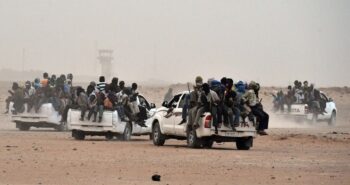Summary: KSA and UAE money for Sahel force with troops from five sub-Saharan states backed by the UN with French leadership to fight jihadists in the Sahara.
Saudi Arabia has agreed to contribute €100 million and the UAE €30 million to the joint African force formed to fight terrorism in the Sahel.
Concern has been growing about security in the Sahel region since the Arab Spring of 2011 led to turmoil in Libya and Egypt. The Sahara has always been a lawless region, with a mix of brigands and religious extremists latterly claiming links with al-Qa’ida and more recently IS.
In 2012 France intervened directly in Mali to deal with Islamic militants linked to al-Qa’ida, many of them Tuareg displaced from Libya. A 12,000-strong UN peacekeeping mission named MINUSMA remains there.
The threat has spread to neighbouring countries, and casualties in recent months reportedlyinclude four UN peacekeepers and a Malian soldier in Mali, four US special forces and four Nigerien soldiers and in a separate incident 13 soldiers in Niger, and 18 killed in Burkina Faso. France has 4,500 troops in the region and Italy is to send several hundred to Niger next year.
In July a new G5 Sahel force was launched in Bamako, Mali, with French support and soldiers from Mali, Niger, Burkina Faso, Mauritania and Chad.
Security Council authority (resolution 2359) was secured after some US reluctance about funding had been overcome. Test operations have already been carried out by a mixed force 750 strong.
The extremists are no more than 1,000 according to French estimates, but the area is larger than Europe and numbers uncertain. The intention is reportedly to increase the force to 5,000 by March 2018, with two battalions each from Mali and Niger and one each from Burkina Faso, Chad and Mauritania.
On 8 December the Security Council passed unanimously a further resolution 2391 agreeing to provide UN operational and logistical support to the joint force (but not using “Chapter VII language”, UN jargon for authorisation of military action).
On 13 December President Macron hosted a meeting in Paris to gather support for the force which was attended by the five Sahel states, the German Chancellor, the Prime Ministers of Italy and Belgium, the foreign ministers of Saudi Arabia and the UAE and representatives of the UN, EU and African Union.
In his closing statement Macron said that agreement had been reached on operational organisation, a single command, and objectives for the first half of 2018.
The Sahel countries are among the poorest in the world, so finance for the new force is critical. Pledges now cover the €250 million initially required.
The US has reportedly pledged $60 million, the EU €50 million, France €8 million, and each of the participating African countries €10 million, with other pledges from Denmark and Luxembourg.
Pledging €100 million in Paris on 13 December the Saudi Foreign Minister said as reported by Reuters that Saudi Arabia would provide logistical support, intelligence and training using the platform of the Islamic Military Counter Terrorism Coalition (a group of some 40 Muslim majority nations who met last month in Riyadh to begin fleshing out an alliance conceived two years ago by MBS – our posting of 15 December 2015 – which has not yet done anything).
The threat extends to the Saharan areas of several Arab countries – Sudan, Egypt, Libya, Algeria, Morocco – but they have not been directly involved. President Macron told a journalist that he had invited Algeria to cooperate; “it’s Algeria’s decision but I want their help.” Reuters comments that Algiers remains suspicious of military activity by its former colonial ruler near its border.
Speaking on 8 December in the Security Council of which it is a non-permanent member Egypt confined itself to grumbling about the means of support for the joint force. Three permanent members, UK, Russia and China, voted for the two resolutions but have otherwise played no part.
_______________




